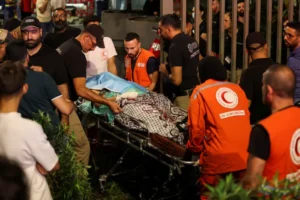How Israel attempts to justify indiscriminate attacks on civilians (and why it’s failing)

A person is carried on a stretcher outside American University of Beirut Medical Center (AUBMC) in the aftermath of pagers exploding in Beirut, Lebanon, 17 September 2024
Craig Mokhiber writes in Mondoweiss on 28 September 2024:
In the wake of Israel’s brutal mass terror attack on Lebanon, deploying internationally proscribed booby traps through pagers and other communication devices distributed in communities across Lebanon (and Syria), and predictably resulting in the death and maiming of large numbers of civilians, the international legal and human rights community, shocked by the blatant criminality of the attack, roundly condemned it.
And blatant it was. International humanitarian law (IHL) explicitly prohibits the use of booby traps or other devices in the form of apparently harmless portable objects (like pagers) that are specifically designed and constructed to contain explosive material.
It also prohibits indiscriminate weapons, tactics, and attacks, such as distributing booby-trapped devices across a population in circumstances where the originators of the weapons would have no way of knowing who was holding or close to the device when it detonates.
It prohibits the intentional spreading of terror among the civilian population, as was clearly intended in this case, and in the low-flying Israeli jets that followed, emitting sonic booms and dropping flares to frighten the already terrified population.
It prohibits the targeting of non-combatants, a status held by many of those who received the pagers. It is a clear violation of the IHL principle of precaution, as no effort was apparently made to protect civilians who were in the vicinity of the explosions.
And international human rights law prohibits extrajudicial executions.
As was clearly intended, dozens were killed and thousands more were wounded, many suffering severe, traumatic injuries, and a significant number were permanently disabled. Victims included children, women, passersby, medical personnel, civilian workers, and others.
Even among the people affiliated with Hezbollah (which is not only a military force but also a political party, part of the elected government, and administrator of several civilian programs and services), many were reportedly not involved in any way with military operations or functions. In other words, many of the victims– including some of the persons actually targeted– were civilian non-combatants, and thus protected persons under international humanitarian law.
Indeed, so clear was the criminality of the act that unequivocal statements of condemnation and calls for legal accountability were quickly issued by authoritative voices from across the globe. International organizations, human rights groups, humanitarian law scholars, and prominent international lawyers all agreed: this was a crime under international law, and one marked by exceptional cruelty and audacity.
